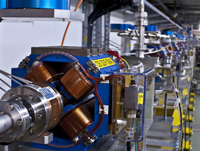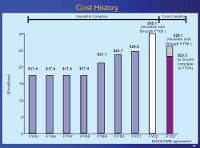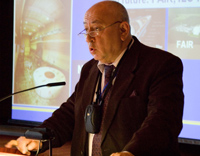 |
|
|
 |
Wanted: linear collider studies leader

All this could be yours: the CLIC test facility. Image: CERN
|
If you have always wanted to lead a global team of accelerator and detector experts to work with you on the electron-positron collider concepts of the future, directing the way particle physics will take after results from the Large Hadron Collider LHC, then the following CERN position will certainly interest you.
Applicants are advised to grow large feet because the position comes with a pair of shoes that is difficult to fill: Jean-Pierre Delahaye, who has been CLIC Study Leader since 1994, retires next year. He will of course keep a strong interest in linear collider projects. The "new Jean-Pierre", according to the vacancy note, will continue the central role and "lead the linear collider work at CERN in a new project phase. You will also have a strategic international role to participate in shaping the linear collider and detector landscape beyond the host Organization."
So if you know your way around accelerators and detectors, feel at home in international collaborations and can lead, inspire and empower people apply by 30 May! An international selection board has been appointed to conduct the interviews. With a bit of luck you might be able to look out over Mont Blanc from your future office.
Read the full job ad on CERN's website.
|
 |
|
|
 |
|
 |
 |
|
|
 |
From symmetry magazine: A field where jobs go begging
With a growing demand for particle accelerators in science, medicine, and industry, accelerator science is in desperate need of skilled specialists.
Tony Favale is looking to hire.
Business in the particle accelerator world is booming, as is business at Advanced Energy Systems, where Favale is president. His company, with offices in New York and New Jersey, is doing research and design work for the next generation of accelerators, which will be employed in electron lasers for the Navy, radiation detectors for the Department of Homeland Security, and more efficient particle colliders at US national laboratories.
But of the seven positions he was advertising in November, three were still unfilled in mid-March because Favale can't find enough qualified accelerator scientists. The shortage is forcing the scientists and engineers he already employs to work overtime. Favale isn't picky; he says he'd be comfortable hiring people with experience in other fields, such as vacuum or radio-frequency technology, and teaching them the accelerator science on the job.
Read more...
-- Chris Knight |
 |
|
|
 |
From New York Times
3 May 2010
Particle Detector Shows Promise, if Nothing Else
A new widely anticipated experiment underneath a mountain in Italy designed to detect a sea of dark particles that allegedly constitute a quarter of creation did not see anything during a test run last fall, scientists reported Saturday.
Read more... |
|
From nature
30 April 2010
Fusion reactor aims to rival ITER
But scientists doubt that IGNITOR will lead to fusion power
Read more... |
|
From NGS news
30 April 2010
Очарованные кварками
Институт ядерной физики СО РАН приблизился к мечте, которую его ученые вынашивают почти 15 лет.
Read more... (in Russian) |
|
From NGS news
26 April 2010
СО РАН займется девятью мегапроектами
В рамках концепции развития СО РАН до 2025 года запланирована реализация 9 приоритетных проектов на 22,6 млрд руб., сообщила пресс-служба отделения.
Read more... (in Russian) |
|
From Interfax
23 April 2010
Проект создания электрон-позитронного коллайдера включен в программу развития сибирского РАН
Read more... (in Russian) |
|
|
 |
Cost and cost growth in science megaprojects

The documented early cost history of the International Space Station. |
Many of the most important science questions facing us in the 21st century require developing very large facilities. Certainly, small-scale science is very much alive and innovative single-investigator research continues to produce many important discoveries. But, the trend towards larger science seems inevitable and we scientists need to make sure such facilities are done cost effectively, if we expect society to support us. This means we must very carefully choose which projects to develop, so that we will produce the best science. But we also must keep the scope of our projects so that they are affordable, and we must execute the projects in a manner that will contain cost growth. So far, the record is not very good.
Read more...
-- Barry Barish
Director's Corner Archive |
 |
|
|
 |
Alexei Sissakian

Alexei Sissakian during his talk at the 2008 GDE meeting in Dubna, Russia. Image: ILC
|
The Directorate of the Joint Institute for Nuclear Research (JINR, Dubna) deeply regrets to announce that Academician Alexei Norairovich Sissakian, the Director of JINR, a member of the Presidium of the Russian Academy of Sciences, a distinguished theoretical physicist and organizer of scientific research based on broad international cooperation, passed away on 1 May 2010 in his 66th year of life.
Read the obituary
|
 |
|
|
 |
First Baseline Assessment Workshop
The GDE will hold the 'First Baseline Assessment Workshop' on the Tsukuba Campus of KEK, from 7 to 10 September. It will focus on single-tunnel high-level RF systems and the accelerating gradient. Mark the date in your calendar and check future issues of NewsLine for more information.
arXiv preprints
1005.0409
Tests of a Digital Hadron Calorimeter
1004.4996
Study of the interactions of pions in the CALICE silicon-tungsten calorimeter prototype
|
|

